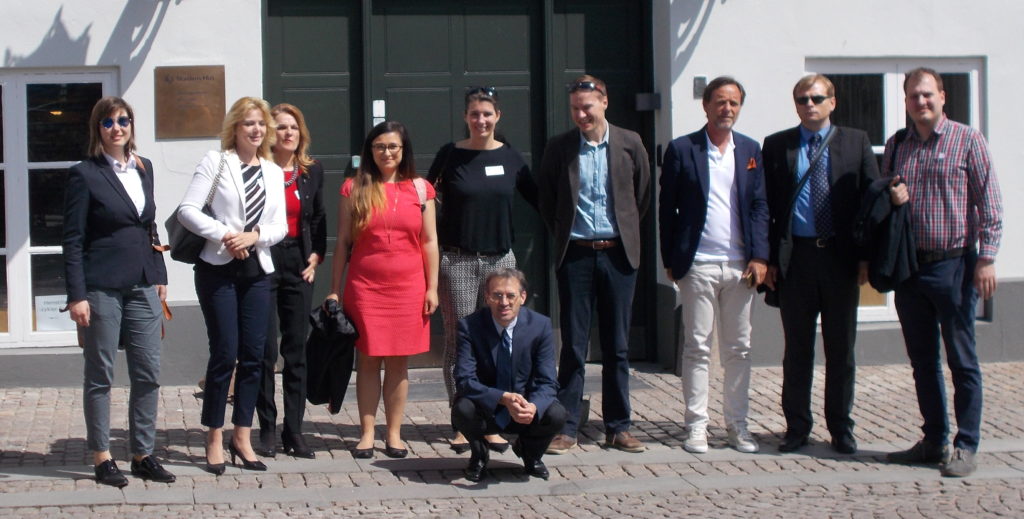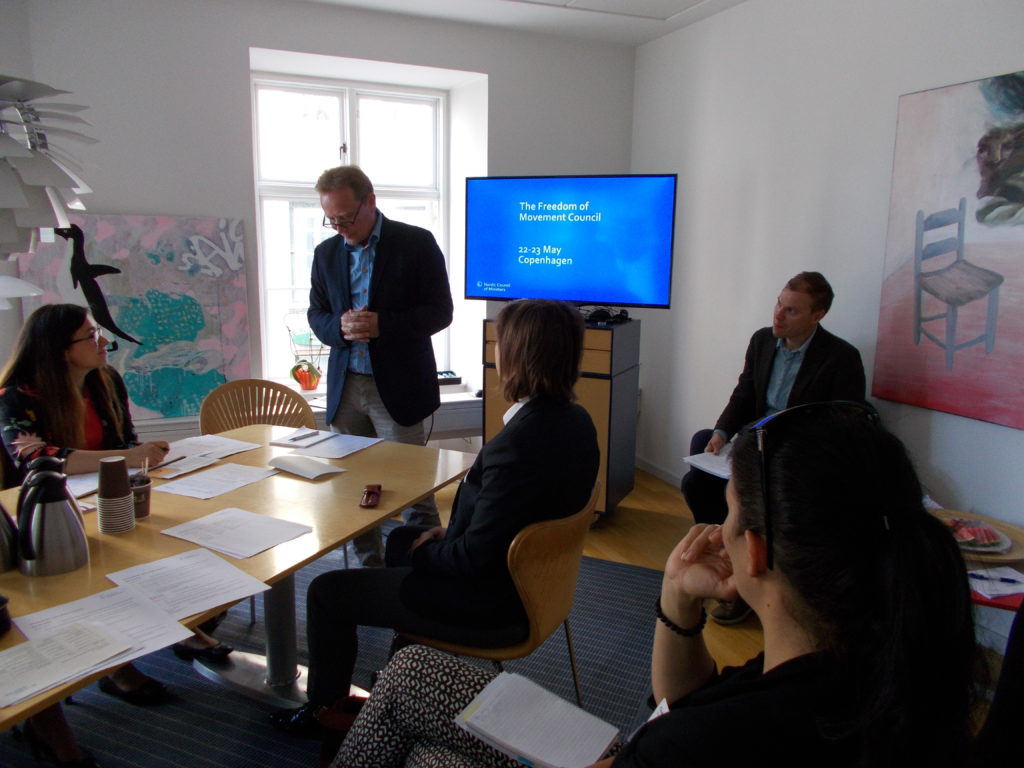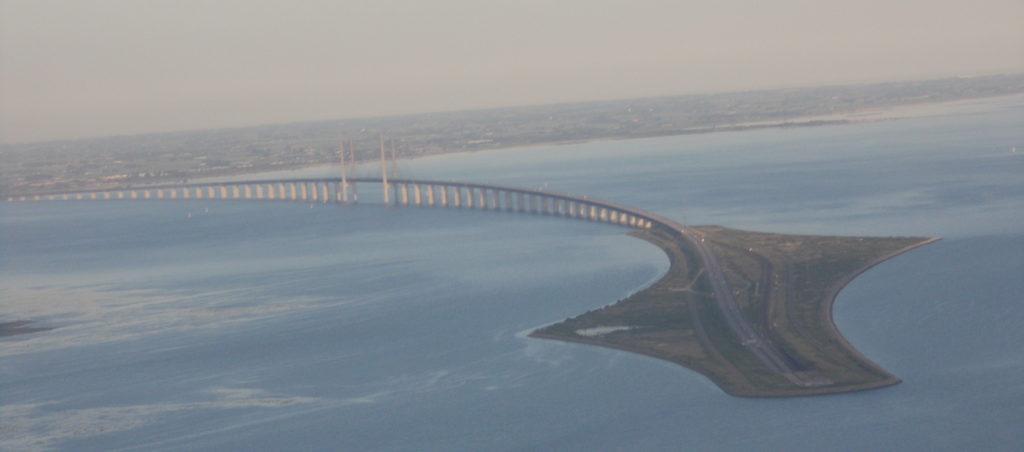On 22nd and 23rd May, within the framework of the project facilitating the legal harmonisation between the Visegrad countries, the representatives of the cooperating partners and the ministries of the four countries visited Copenhagen and Malmö. The objective of the study visit was to get to know about the work and internal mechanisms of the Freedom of Movement Council established by the Nordic Council of Ministers in 2014. The objective of the project itself to promote the set-up of a similar entity at V4 level dedicated to eliminate the obstacles hindering the mobility among the member states following the model of the above council.

The members of the delegation were: Katarzyna Wojnar (EUROREG, Warsaw), Katarzyna Kos (Governmental Legislation Center of Poland), Pavol Foltín Office of the Governor of South Moravian Region, Brno), Tomáš Swiatlowsky (Ministry of Agriculture and Rural development, Bratislava), Katalin Fekete (Ministry of Foreign Affairs and Trade, Budapest), as well as Zsuzsanna Fejes and Edit Soós (University of Szeged). The leader of the delegation was Gyula Ocskay secretary general of CESCI, the lead partner of the project.
The one-and-a-half-day program was especially busy and informative; thanks should go for it in particular to senior advisers, Claes Håkansson and Petri Suopanki who are in charge of the administration of the Freedom of Movement Council at the Secretariat of the Nordic Council of Ministers.

At the first day in the morning, the delegation was welcomed at the Nordic Cultural Fund by Kenneth Broman, chief of staff who presented the functioning of the Nordic Council of Ministers and the Nordic Council (the parliament of the Nordic States). Lise Østby, senior adviser of the department of Growth and Climate spoke about the role and participation of the local and regional actors in the elimination of cross-border obstacles. The principles, the structure, the procedures, all activities related to the documentation and database development of the Freedom of Movement Council was introduced by Claes Håkansson, Daniel Jaakkola and Petri Suopanki.
Thanks to the close cooperation of the Nordic States of more than half a century, the number of legal obstacles are remarkably lower than anywhere else in Europe. The history of free movement without passport started 60 years ago and nordic citizens can use the education and health care services in each nordic country without limitations. Regardless of the above, there are still several smaller and bigger obstacles hindering cross-border mobility. The Freedom of Movement Council which was established for abolishing these obstacles prioritises every year 8 to 12 such obstacles, takes initiatives for their elimination and monitors the activities taken at national level, as well. The information on the problems arrive from regional level stakeholders, and they are analysed and prepared for further decision and measures of the council by the Secretariat.

The V4 delegation spent the afternoon at the office of the Øresunddirekt whose main mission consists of the promotion of cross-border labour mobility between the two border cities and regions connected by the Øresund bridge and provision of related information. First, Britt Andrésen, senior analyst of the Øresund Institute gave an overview on the history of the integration of the border area – with a special focus given to the role of the bridge. As it was mentioned, the number of the commuters in the region had reached its peak period on 2008 when 20 thousand people had commuted mainly from Sweden to Copenhagen. These commuters have to face a lot of barriers of legal nature the solution of which is facilitated by the office introduced by Sandra Forsén head of office and Malin Dahl coordinator of Swedish Employment Service. During their work they face many legal obstacles about which they inform the Secretariat of the Nordic Council of Ministers.
The cooperation is operating at the same way with the Greater Copenhagen and Skåne Committee visited by the delegation at the second day in the morning. Matilda Sommelius project manager and Sara Røpke head of the secretariat spoke about the evaluation of the cross-border integration and the way how they facilitate this Swedish-Danish integration by the identification and resolution of the legal barriers. The office works in direct cooperation with the two governments so they can launch initiatives of legal harmonisation by themselves but they also deliver problems to the Freedom of Movement Council.


Finally, their presentation was followed by Jakob Tråsdahl, head of Copenhagen office of Hello Norden network. Hello Norden started in Stockholm in 1998 as a call center. Now, they have 8 offices (one in every member country and autonomous territory) run by a local civil association financed by the Nordic Council of Ministers. These offices are gathering and share the information on transnational mobility with the help of a web page and a back-office service. The major part of the legal obstacles is identified by themselves what they channel in the above mentioned way to the mechanism of legal accessibility of the Nordic Council of Ministers.
Taking into account the degree of organisation of the stakeholders of the network and the whole system, it is not a coincidence that the mechanism facilitating the internal cohesion of the Nordic States is operating with an exceptional effectiveness.
The experiences persuaded the members of the V4 delegation that regardless of the challenge caused by cultural and political differences it is worth preparing the proposal and following the nordic model. The next milestine of the project consists of the study on this nordic model to be elaborated by the partners based on the experiences of the study tour and the analysis of the literature, until the end of next July.